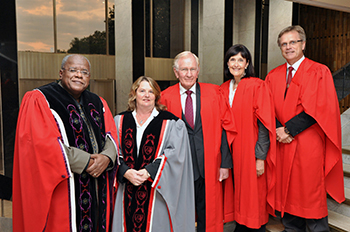Latest News Archive
Please select Category, Year, and then Month to display items
22 September 2021
|
Story Michelle Nöthling
|
Photo Supplied
 Annemarie Le Roux.
Annemarie Le Roux.
“I love working with children.” This is one of the first things Annemarie le Roux mentions when asked to describe herself. This love for children propelled Annemarie into the field of education and she graduated in 2006 with a BEd in Foundation Phase at the UFS. Annemarie immediately immersed herself in the Deaf community, enriching the lives of children at the Thiboloha School for the Deaf in Qwaqwa and the De la Bat School for the Deaf in Worcester.
The academic world enticed Annemarie back to the University of the Free State (UFS) and she was appointed as a junior lecturer in the Department of South African Sign Language (SASL) and Deaf Studies in 2013. Going from strength to strength, Annemarie completed her master’s degree in SASL in 2019, and published an
article earlier this year that she co-wrote with Marga Stander. In this article, they found that SASL “has become an increasingly popular language that hearing university students want to learn as a second language” and subsequently explored different teaching methods used for this emerging group of interested students.
Although now firmly established in academia, Annemarie is still committed to the practical application of SASL. “I am closely involved in student and community engagement through the
SIGNALS Sign Language student association that helps empower the Deaf community and South African Sign Language.” She also interprets for the Deaf community whenever she gets an opportunity, as well as for Deaf students in class and meetings.
On the importance of Sign Language and the recognition of the Deaf community in South Africa, Annemarie believes it will open greater opportunities for development. “More people will be able to learn SASL, and it might even become a subject in school for hearing children.”
Wrongful suffering must be compensated, Prof Johann Neethling argues
2016-04-20

From the left are Prof Jonathan Jansen, Vice-Chancellor and Rector, Prof Caroline Nicholson, Dean of the Faculty of Law, Prof Neethling, Prof Rita-Marie Jansen, Vice-Dean, and Dr Brand Claassen, Head of the Department of Private Law.
Photos: Stephen Collett
|
On 11 April, the Faculty of Law held the first of the year’s series of Prestige Lectures presented by Prof Johann Neethling, Senior Professor in the Department of Private Law. The event was attended by senior faculty members, the Dean of Law Prof, Caroline Nicholson, and the Vice-Chancellor and Rector, Prof Jonathan Jansen.
In his opening remarks, Prof Jansen said “Prestige lectures are at the heart of a university’s academic endeavour. It would serve the university community well to present them more often, as they go to the heart of important issues that affect society”
Prof Neethling made a compelling case for compensation for wrongful suffering by a child born with impairments. Since the mid-1960s, the actions of wrongful conception and wrongful birth have been recognised in South African law. Wrongful conception is defined as when a healthy child is born as a result of failed sterilisation or abortion, and wrongful birth is when a doctor fails to inform parents of a disability before the birth of their child.
“The reality is that a child born with impairments may indeed suffer (sometimes extreme) pain, loss of amenities of life, which would justify an award of damages,” he said.
So far, the action for wrongful suffering has been dismissed by the High Court and the Supreme Court of Appeal. However, he highlighted several cases where wrongful conception and wrongful birth was recognised by the courts.
“Why can the same approach (for wrongful conception and wrongful birth) not be followed in wrongful suffering claims by accepting that a disabled child seeks to address the consequences of its birth?” he asked.
Prof Neethling is regarded as one of the greatest minds in Private Law, not only in South Africa but in the African continent.
A festschrift, Essays in Honour of Johann Neethling (2015), with contributions from more than 50 of his peers around the world, was also launched at the lecture.